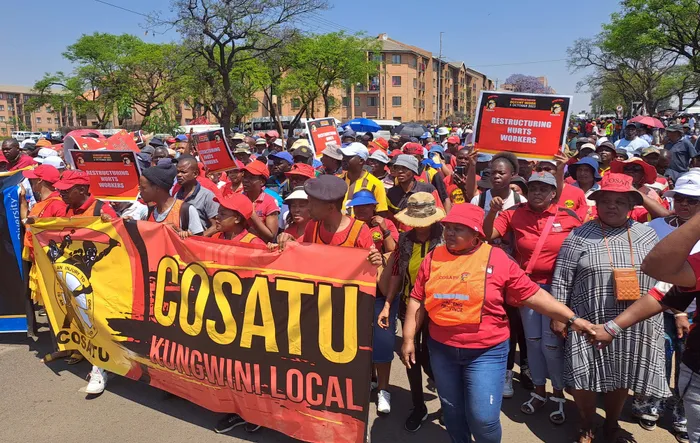Unions must bat for workers instead of being political pawns

Picture: Jacques Naude / African News Agency (ANA) / October 5, 2023 – Cosatu members march from Marabastad to Treasury and Tshwane House. They are demanding the implementation of the bargaining agreement signed with SALGA and to address the socio-economic climate faced by South Africans. Organised labour must wake up and resist manipulation by politicians, and put workers interests first, the writer says.
By Bheki Mngomezulu
Trade unions are divided, from a general perspective, into four types: craft-based unions, industrial unions, general unions and federations. One common denominator among these is their primary goal of addressing issues that concern different types of workers.
Flowing from the above, trade unions are expected to fulfil five functions:
- negotiate agreements with employers on both wages/salaries and working conditions;
- discuss major changes in the workplace that will affect workers;
- discuss concerns that members have about their employers;
- accompany members to disciplinary hearings and grievance meetings; and
- provide members with both legal and financial advice.
South Africa is no exception in this regard, and organised labour has a long history in the country. In 1919, Clements Kadalie and other dockworkers established the first trade union for black people, called the Industrial and Commercial Union (ICU). The primary objective of this union was twofold – to fight for a minimum living wage and decent working hours.
In 1979, the Federation of South African Trade Unions (Fosatu) was formed. The primary objective of this labour movement was to place the plight of workers and their various struggles at the centre of its activities. While some believed in non-racialism within trade unions, others in Fosatu strongly believed trade unions had to be led strictly by black people.
This argument was premised on the understanding that black people were the ones who suffered the most at the hands of their employers.
The establishment of the Congress of South African Trade Unions (Cosatu) on December 1, 1985, brought hope to workers that they would have a big federation where several unions would affiliate. Indeed, Cosatu pushed the struggle for workers and represented their needs and demands.
The formation of the Tripartite Alliance on February 11, 1990, was good in the realm of politics in the sense that it strengthened the ANC. However, this new development compromised the plight of workers. Being part of the governing party, Cosatu found itself singing for two audiences – workers and the ANC. Affiliate trade unions were weakened and could no longer face the government and employers with the same vigour.
In-fighting within Cosatu was a bad omen for workers. It meant that the leadership spent their time fighting personal battles and wrestling for positions as opposed to putting workers’ needs first. Politicians grabbed this opportunity and further divided individual trade unions.
The expulsion of Zwelinzima Vavi from Cosatu and the resultant loss of his position as general secretary of this federation marked a new epoch in the history of organised labour in South Africa.
His decision to establish a rival federation called the South African Federation of Trade Unions (Saftu), in 2017, meant that the country would have two rival federations. With over 20 affiliated trade unions, Saftu became a force to be reckoned with as far as organised labour was concerned. Intra- and inter-trade union conflicts have weakened them.
Noticeably, despite having two big federations, the unemployment rate in South Africa has been on an upward trajectory. Meanwhile, labour unions are fixated on internal conflicts and wrestling for positions. Similarly, workers’ working conditions are not where they are supposed to be.
Given the basic functions and responsibilities of trade unions outlined earlier, there is no doubt that the country’s organised labour has been derailed from its original mandate. Some see trade unions as vehicles to propel them to stardom. Others use trade unions to amass personal wealth. There are those who use their trade union positions as vehicles to join politics and land good positions in government.
The last point speaks to the link between trade unions and political parties. Politicians are smart. They have realised that trade unions are able to propel parties to power. They entice trade union members to canvas for them.
This makes it difficult for trade union leaders to put workers first – especially when the government is the main employer. Instead of workers and trade union leaders rallying behind one another, they take different positions depending on the political parties they are aligned with. In the process, workers’ needs take a back seat.
With 2024 being an election year, organised labour will once again be poached by politicians to canvas for them. This happens at a time when the unemployment rate, even among graduates, is unacceptably high. The fact that South Africa has over 600 political parties already registered with the Electoral Commission of South Africa (IEC) means that organised labour must be vigilant. Importantly, the leadership of organised labour must give workers priority when deciding who to vote for and why.
So, against this backdrop, to what extent have trade unions deviated from their original mandate? Why are these trade unions susceptible to being wooed by politicians? If the trade union leadership is co-opted by politicians, why is it difficult for the general membership to take a different position? Why is it difficult for them to learn from their previous mistakes? Importantly, what should be done to end this practice?
Not all these questions are easy to answer. The reason is that some of them are complex.
The problem has deep roots. Organised labour must wake up and resist manipulation by politicians. Workers must come first.
Prof Bheki Mngomezulu is Director of the Centre for the Advancement of Non-Racialism and Democracy (CANRAD) at the Nelson Mandela University.